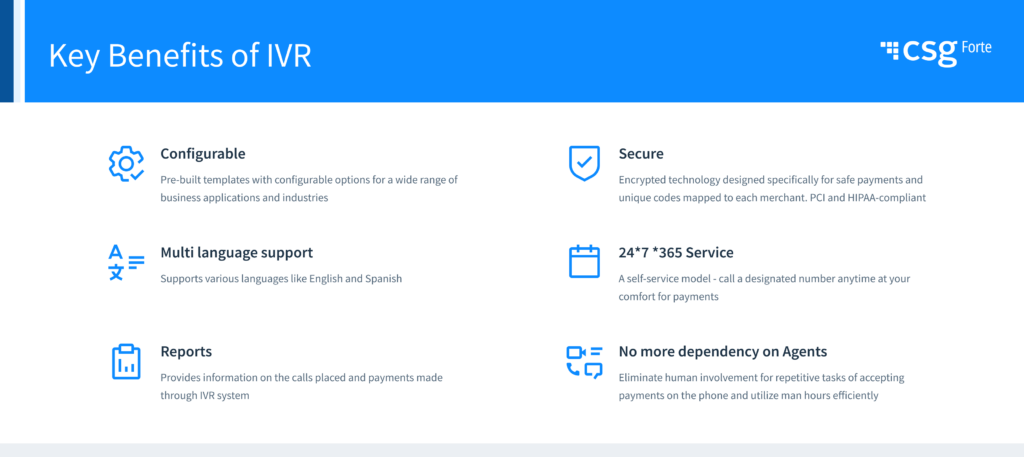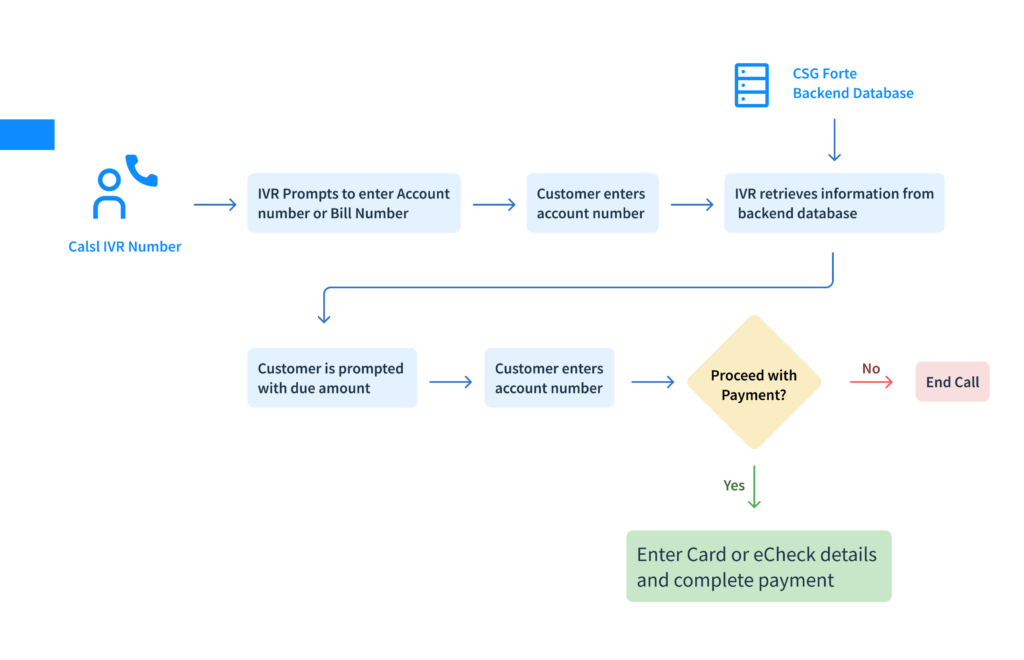Interactive Voice Response (IVR)
24/7 Pay by Phone Service
Overview
Through IVR, CSG Forte provides an effortless and secure automated payment option for merchants without the need for customers to speak to a contact center agent. IVR is a part of CSG Forte’s BillPay solution where customers dial a designated number then follow a sequence of prompts to collect the required information and ensure the completion of payment. During each call, the IVR system prompts the caller for information, which he or she then transmits back to the IVR using the DTMF tones of the phone’s touchtone keypad. Prompts replay up to 3 times soliciting user input. Through IVR, users can be informed that a service fee is being charged for the use of the system by a third party.
With CSG Forte’s IVR, we provide a dedicated IVR toll free phone number and a unique jurisdiction code (also called a jcode), which is a unique four-digit number used in the government industry.
What are jcodes?
Jurisdiction codes (Jcodes are used to identify specific geographic areas or administrative regions for which the IVR provides service or information. A jcode is uniquely assigned to a merchant where all the merchants share a common phone number, and caller needs to enter the jcode as the first step. These unique jcodes are used to identify merchants and ensure that payments are correctly processed and attributed. When customers interact with an IVR system to make payments, they are typically prompted to enter information such as an invoice number or an account number to identify what is being paid. They may also be asked to enter a specific code related to the merchant or the service being paid for. This process allows for secure and efficient payment transactions without the need for direct interaction with a customer service representative. Merchants can also have their own toll-free number and can route calls to a dedicated local number, or CSG Forte can also provide a toll-free number if the merchant doesn’t have one already.
Where can CSG Forte IVR systems be used?
IVR systems are used extensively in various industries. Popular IVR payment sectors include:
- Government services
- Health Care
- Finance
- Retail and e-commerce.
- Utilities
- Property management
Features of CSG Forte IVR system
- Personalized IVR messages and prompts can be configured.
- Easily handle high call volumes.
- English & Spanish voice prompts.
- Credit card transactions are processed in real-time.
- Echeck transactions can be verified with positive account information in real-time.
- Download daily transaction details using our online browser reporting tools or using a secure FTP site.
- Real-time account or balance due information from merchant systems.
Use Cases
IVR in the Government Sector
CSG Forte IVR systems are widely utilized in the government sector. They are mainly used for Utility Services, like allowing citizens to check and complete bill payments without speaking with a representative.
IVR in the healthcare sector
IVR in healthcare is a boon that can enhance overall efficiency and streamline processes. Consider a scenario where a patient has visited the hospital or a clinic, and the bill is generated and sent to mail. The patient can pay the bill using CSG Forte IVR if the hospital has set up IVR services. This provides 24/7 access to payment options, increasing overall efficiency.
Benefits of IVR
There are numerous benefits of IVR system, any business that accepts payments can benefit from a secure IVR automated phone payment system. Refer the following image which lists the top benefits of CSG Forte IVR system.
How do IVR payments work?
IVR payments work by enabling customers to make payments, track account balances, and carry . Pre-recorded voice interacts and prompts the users and ensures they are directed towards payment completion.
Quick steps for secure IVR payments
- Customers make a call to IVR number.
- Customer is prompted to enter jcode and retrieve the location based on jcode.
Note: If Merchant is utilizing a dedicated IVR number there is no prompt or jcode. - IVR customer is prompted to enter a unique identifier such as bill number, invoice number, customer id based on the configuration.
- Account Details can be retrieved based on source configuration which includes retrieving account balance from external service providers).
- If an account is not found, IVR prompts to re-enter the account details.
- If an account is found, IVR prompts with the due amount and processes for the payment also based on Merchant’s requirements.
- Customer can choose payment type and enter the payment account details.
- IVR then proceeds for payment processing after authorization.
FAQs
Below, we have provided answers to your IVR queries.
- What is IVR authentication?
- IVR can authenticate callers with one or more inputs to ensure that we are providing the due amount information to the right person. The IVR can ask for the date of birth, zip code, or some other key to enter along with the account/bill ID, and the caller must enter the correct information that matches the bill.
- Can IVR integrate with external tools?
- IVR can integrate with external Web Service/ Web API’s, when callers enter the account id IVR can connect to partner/merchant service to get the account/bill info and can post real time transaction info after the caller completes the payment through IVR.
- Is IVR PCI DSS Compliant?
- Yes, IVR is a PCI DSS compliant; all transactions are processed securely.
- We have a mobile application, how is IVR different?
- The usage of mobile applications is a bit different compared to IVR. Creating and maintaining a mobile application requires a lot more effort, and it is only used occasionally to allow customers/users to make a payment.IVR can avoid all the hassle to maintain the mobile application and allows easily making payment.


